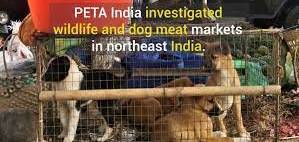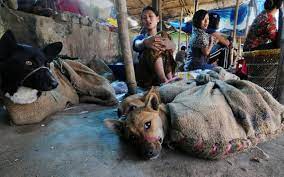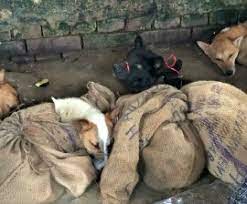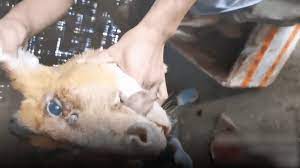
Traditional food markets, sometimes referred to as 'wet markets' , vary considerably from country to country and even from province to province, depending on local culture and socio-economic conditions, as well as variety and food preferences. In many countries, they are the main source of affordable fresh food, especially for many low-income groups. These markets have an important economic, cultural and social role, and are a major source of livelihood for millions of people in urban and rural areas. All traditional food markets, however, must share the same goal: to supply the community with healthy and nutritious food.
Only here, we report regularly in this newspaper that this rule is very far from being respected and all these markets are in great majority the scene of acts of barbarism and unbearable cruelty on the animals.
Here is a new example reported by a member of PETA India.
It is perhaps useful to recall the emergency regulations in force to suspend the sales of live wild animals on traditional food markets to measure the abyssal chasm that exists between theory and what is practiced today in the world. day-to-day. WHO, OIE and UNEP have called on all relevant national authorities to suspend trade in wild mammals captured live for food or farming, and close sections of food markets that sell captured wild mammals. alive as an emergency measure, unless you have demonstrable effective regulations and an adequate risk assessment
WHO, OIE and UNEP also call on competent national authorities to strengthen the regulatory basis that aims to improve hygiene and sanitation standards in traditional food markets in order to reduce the risk of zoonotic transmission. In the context of the current pandemic, additional crowd control and physical distancing measures, hand washing and disinfection stations as well as education on hygiene rules for breathing, and in particular on wearing the mask, must be introduced to the markets in order to reduce the risk of human-to-human transmission of diseases
Significant problems can arise when these markets allow the sale and slaughter of live animals in areas open to the public, especially when dealing with wild animals, the potential risks of which are difficult to properly assess. When wild animals are housed in cages or pens, and their slaughter and dressing takes place in open market areas, they become contaminated with body fluids, feces and other wastes, increasing the risk transmission of pathogens to workers and customers, and potentially leading to spillover of pathogens to other animals in the market. In such environments, it is possible for viruses of animal origin, including coronaviruses, to amplify and spread to new hosts, including humans. Most of the emerging infectious diseases, such as Lassa fever, Marburg hemorrhagic fever, Nipah virus infections and other viral diseases, are of wild origin. Zoonotic viruses of the coronavirus family have been linked to the 2003 Severe Acute Respiratory Syndrome (SARS) outbreak and Middle East Respiratory Syndrome (MERS), first detected in 2012. The COVID- pandemic 19 results from the introduction of the novel coronavirus, SARS-CoV-2, into human populations. Although the specific mechanism of SARS-CoV-2 emergence has not been definitively identified, interactions may have occurred at some point, or over time, resulted in the transmission of agents. pathogens from one species to another, even several species. “Traditional food markets” , which includes “wet markets” , informal markets and agricultural markets sell food of animal and non-animal origin and dried products and live animals are housed and slaughtered on site.
The World Health Organization (WHO), Food and Agriculture Organization of the United Nations (FAO), World Organization for Animal Health (OIE) and United Nations Environment Program (UNEP) recognize the repeated emergence of zoonoses and the links some of them have along the wildlife trade value chain.
And it is certainly not the recent report from the member of PETA India that will be reassuring.
Dead dogs lying on the ground with their intestines out and coiled over their bodies, live frogs stuffed into sealed plastic bags, a bare-handed vendor holding the decapitated head of a deer - all for sale as meat . New PETA India investigation of wildlife markets in multiple states reveals widespread violations of Indian animal welfare laws. These markets pose a major threat to the health of residents of India and around the world in the fight against zoonoses (Infectious Disease of Vertebrate Animals Transmitted to Humans) such as COVID-19 or rabies.
Following the visits to the local Indian markets, here is the kind of sad shows that it is common to attend and this, in defiance of existing laws.
In a market, the meat of deer, wild boars and frogs was sold under the cloak. Needless to say, all of these animals were illegally hunted. Both sellers and buyers handled animal parts with their bare hands Street hawkers in another market also handled live and dead animals with their bare hands. Here dog meat, live frogs in plastic bags, pigeons, quails and ducks were sold for food. Elsewhere still, live eels swarmed for space in small containers, frogs panted in plastic bags, mice scurried frantically into cramped enclosures, worms piled on top of each other, and birds. crammed into metal cages struggling for some space.
Puppies have also been seen trapped in cages. Dogs were also sold for their flesh. The mouths of adult dogs were kept closed with ties and they were thus held in the midst of mass graves.


Once killed, their internal organs were removed and their bodies charred for sale. As PETA India has urgently pointed out in its communication with Indian authorities, these sales are illegal, as dogs and animals protected by the country's Wildlife Law 1972 are not allowed to be killed. for meat in India.
In a village further away, hunters would take animals believed to be protected by wildlife laws to local markets for sale. Despite the legislation, a hunter claimed there were no local restrictions on hunting.
Deer meat was also readily available at a market in another village. Rf was also readily available at a market in One These cruel and disgusting markets are known to all.

The poor conditions in these markets run deep. In 2020, PETA India released video footage showing equally appalling conditions:
- Men at a Delhi market slit the throats of live chickens, skinned them, and handled their flesh, which was soaked in blood and guts, with their bare hands.
- Sacks of struggling crabs and eels were on sale at a fish market.
- The dogs were killed and sold for meat.
Vendors handled and sold the charred remains of wild animals, including monkeys, wild boars, porcupines and deer.
We can no longer count the number of such markets around the world. They are current currencies and it would be wrong to think that they are confined to the only Asian countries as recalls Mimi Bekhechi, vice president of the international programs of PETA
“Whether they sell dogs in Dimapur or birds in Brooklyn, unsanitary live animal markets are unnamed places of suffering and breeding grounds for pandemics. “PETA calls on the World Health Organization to shut down these cruel and dangerous markets around the world and calls on all those upset by these images to switch to a vegan diet. "
PETA India has filed a complaint and alerted local authorities about the live animal markets, which also appear to violate wildlife and animal protection laws.
Posted on 2021-11-20 13:22








Comments